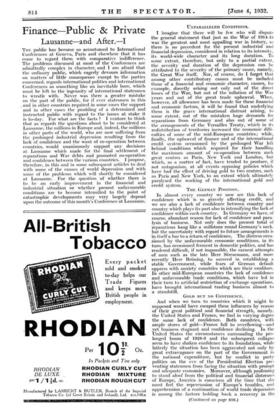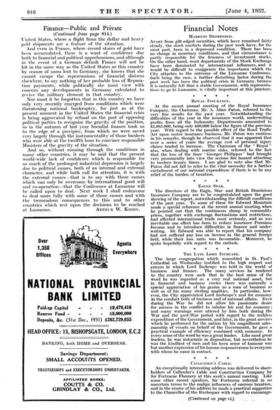Finance—Public & Private
Lausanne—and After.—I
THE public has become so accustomed to International Conferences at Geneva, Paris and elsewhere that it has come to regard them with comparative indifference. The problems discussed at most of the Conferences are admittedly complex in character, and I am afraid that the ordinary public, which eagerly devours information on matters of little consequence except to the parties concerned, regards international politics and international Conferences as something like an inevitable bore, which must be left to the ingenuity of international statesmen to wrestle with. Never was there a greater mistake on the part of the public, for if ever statesmen in this and in other countries required in some cases the support and in other cases the prodding of a determined and instructed public with regard to the issues at stake it is to-day. For what are the facts ? I venture to think that as regards the questions about to be considered at Lausanne, the millions in Europe and, indeed, the millions in other parts of the world, who are now suffering from the prolonged industrial depression resulting from the lack of confidence and the want of co-operation between countries, would unanimously support any decisions at Lausanne which made for the final settlement of reparations and War debts and promoted co-operation and confidence between the various countries. I propose, therefore, in this and in some subsequent articles to deal with some of the causes of world depression and with some of the problems which will shortly be considered at Lausanne. For the question of whether there is to be an early improvement in the financial and industrial situation or whether present unfavourable conditions are to become intensified to the point of catastrophic developments may very largely depend upon the outcome of this month's Conference at Lausanne. UNFAH A TJYT.ED CONDITIONS.
I imagine that there will be few .who will dispute the general statement that just as the War of 1914-18 was the greatest and most appalling war in history, so there is no precedent for the present industrial and financial depression, considered in relation to its intensity, its world-wide character and its long duration. To some extent, therefore, but only to a partial extent, the severity and duration of the depression can be attributed to the severity of the primary cause, namely, the Great War itself. Nor, of course, do I forget that among other contributory causes must be included those of a financial and economic character, causes, for example, directly arising not only out of the direct i losses of the War, but out of the inflation of the War years and out of the great trade upheaval. When, however, all allowance has been made for these financial and economic factors, it will be found that underlying them is the grave international distrust arising, to some extent, out of the mistaken huge demands for reparations from Germany and also out of some of the arrangements of the Versailles Treaty, which in its redistribution of territories increased the economic diffi- culties of some of the mid-European countries; while, finally, the upheaval of finance and of the international credit system occasioned by the prolonged War left behind conditions which required for their handling the maximum amount of co-operation between such great centres as Paris, New York and London, but which, as a matter of fact, have tended to produce, if not antagonism, at all events opposing policies which have had the effect of driving gold to two centres, such as Paris and New York, to an extent which ultimately paralysed the working of the international gold and credit system.
THE GERMAN POSITION.
In almost every country we now see this lack of i confidence which is so gravely affecting credit, and we see also a lack of confidence between country and country which plays its part also in intensifying the lack of confidence within each country. In Germany we have, of course, abundant reason for lack of confidence and para- lysis of business. Not only does the present total of reparations hang like a millstone round Germany's neck. but the uncertainty with regard to future arrangements is in itself a bar to a return of confidence. The distress occa- sioned by the unfavourable economic conditions, in its turn, has occasioned ferment in domestic politics, and has rendered difficult, if not impossible, the earnest attempts of men such as the late Herr Stresemann, and more recently Herr Bruning, to succeed in establishing a stable Government, while fears of German default oppress with anxiety countries which are their creditors. In other mid-European countries the lack of confidence and unfavourable trade conditions, which have led in their turn to artificial restriction of exchange operations, have brought international trading business almost to a standstill.
COLD BUT NO CONFIDENCE.
And when we turn to countries which it might be supposed would have escaped these influences by reason of their great political and financial strength, namely, the United States and France, we find in varying degree the same lack of confidence. Both countries, with ample stores of gold—France full to overflowing—and yet business stagnant and confidence declining. In the United States the circumstances surrounding the pro- longed boom of 1928-9 and the subsequent collapse seem to have shaken confidence to its foundations, while latterly the situation has been aggravated not only by great extravagance on the part of the Government in the national expenditure, but by conflict in party politics on the eve of the Presidential Election pre- venting statesmen from facing the situation with prompt and adequate economies. Moreover, although professing to stand aloof from the political and financial distresses of Europe, America is conscious all the time that she must feel the repercussion of Europe's troubles, and apprehension of a continuation of world trade depression is among the factors holding back a recovery in the
(Continued on page 816.) Finance—Public and Private (Continued from page 814.)
United States, where a flight from the dollar and heavy gold shipments are a feature of the situation. And even in France, where record stores of gold have been accumulated, there is a want of confidence due both to financial and political apprehensions, and although in the event of a German default France will not be hit in the same way as the United States or this country by reason of sums lent to Germany, she knows that she cannot escape the repercussions of financial distress elsewhere, to say nothing of her probable loss of Repara- tion payments, while politically she must view with concern any developments in Germany calculated to revive the military clement in that country: Nor must it be forgotten that in this country we have only very recently emerged from conditions which were threatening national bankruptcy, for just as at the present moment in the United States the financial crisis is being aggravated by refusal on the part of opposing political parties to recognize the gravity of the position, so in the autumn of last year Socialist finance took us to the edge of a precipice, from which we were saved very largely through the instrumentality of those bankers who were able at the twelfth hour to convince responsible Ministers of the gravity of the situation. And so, without running through the conditions in many other countries, it may be said that the present world-wide lack of confidence which is responsible for so much of the prolonged industrial depression is largely due to political causes, both of an internal and external character, and while both call for attention, it is with the external causes—that is to say with those causes which can only be overcome by international good will and co-operation—that the Conference at Lausanne will be called upon to deal. Next week I shall endeavour to deal more fully with some Of those causes and with the tremendous consequences to this and to other countries which rest upon the- decisions to be reached





































 Previous page
Previous page